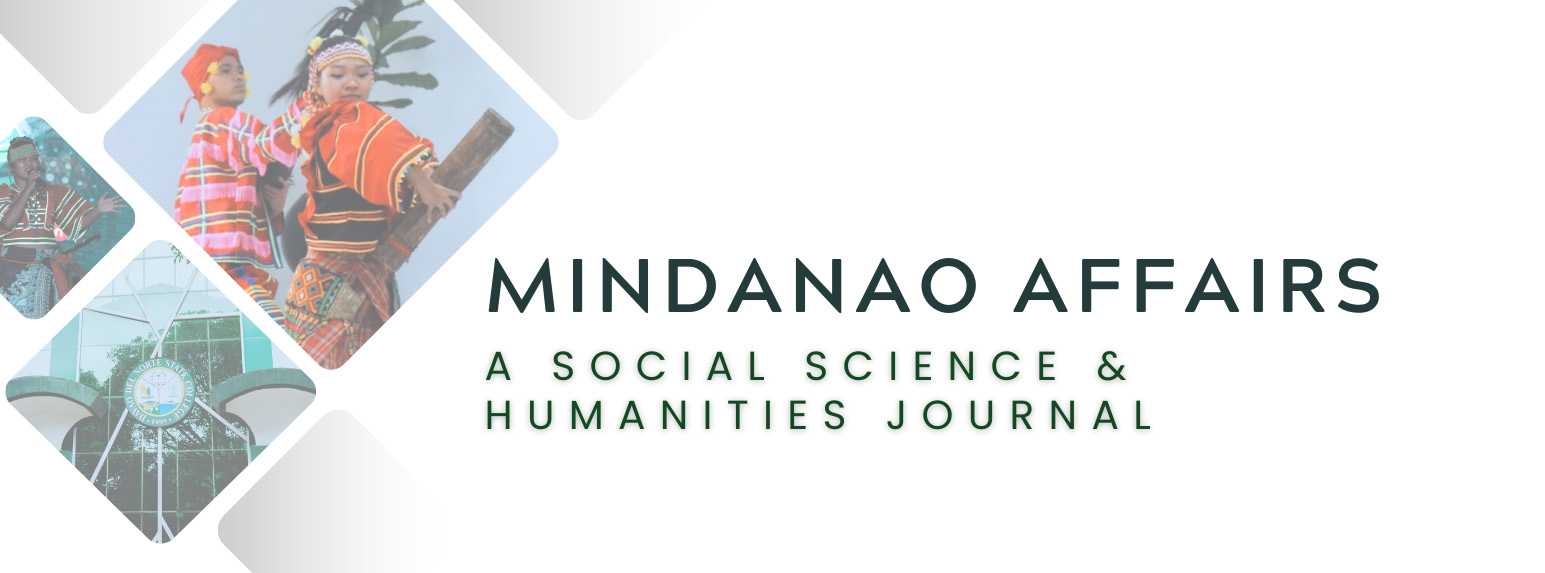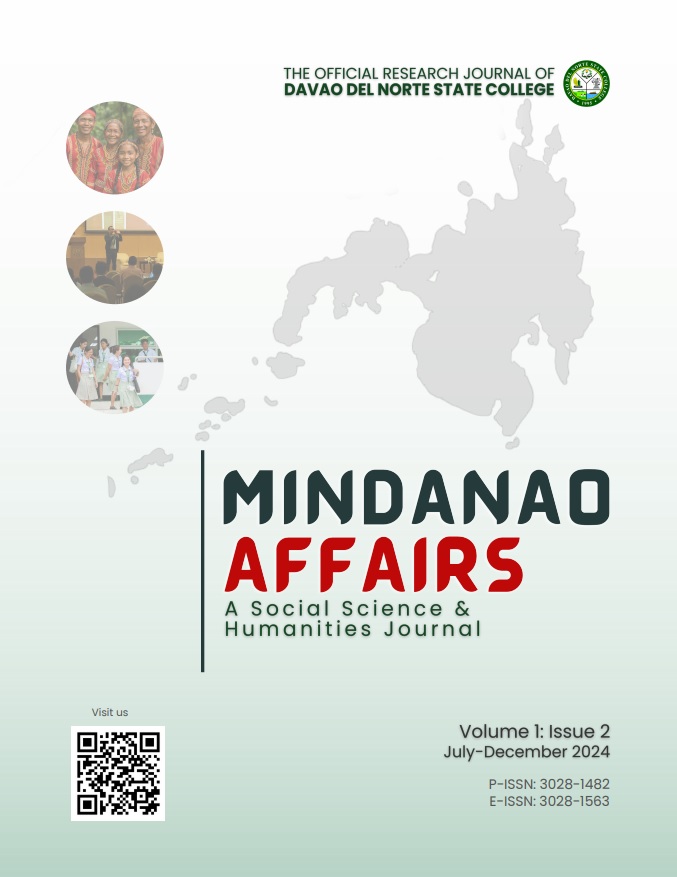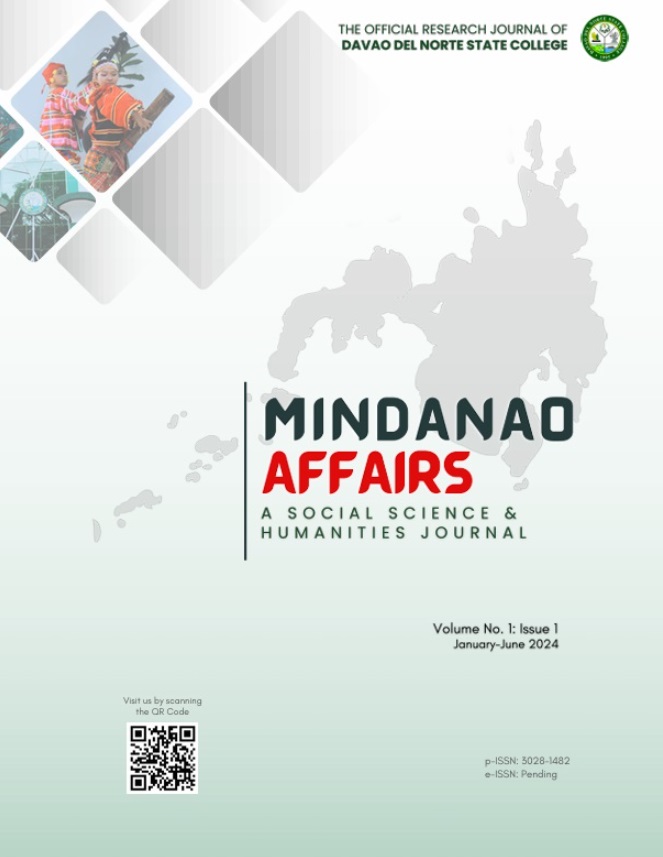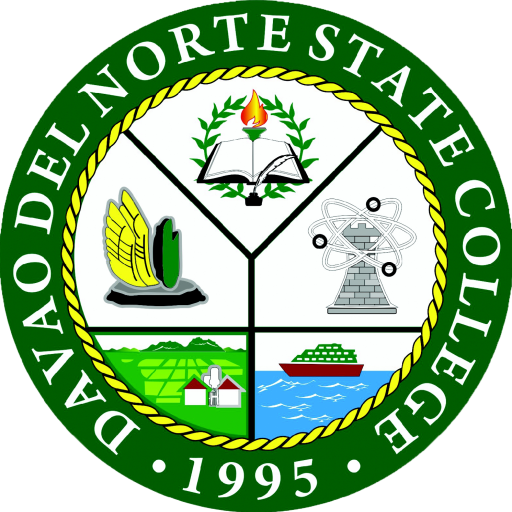
About the Journal
The Mindanao Affairs: A Social Science and Humanities Journal is a Mindanao-based journal that holds a global perspective. It invites submissions from both local and international scholars whose research focuses on a wide range of political, social, cultural, and artistic issues that concern the Mindanao archipelago and its neighboring regions in Southeast Asia.
The journal caters to scholars, policymakers, and practitioners who produce work that is both scholarly rigorous and accessible to a broader audience. Its primary objective is to become the preferred venue for disseminating research findings, analyses, and fresh concepts that are relevant to all disciplines in social sciences and humanities.
Mindanao Affairs welcomes submissions on an extensive array of themes, including but not limited to indigenous peoples and upland communities; coastal resource governance; organizational and policy studies; education for sustainable development; media, communication, and language studies; leisure and tourism studies; disaster and humanitarian studies; business and entrepreneurship; social work and healthcare, among others.
The journal aims to encourage a multidisciplinary approach to understanding Mindanao’s socio-cultural dynamics, bringing together diverse perspectives and promoting a greater appreciation for the region’s richness and diversity.
Print ISSN: 3028-1482
Online ISSN: 3028-1563
Mindanao Affairs publishes biannually (January-June) and (July-December).
About the Publisher
Davao del Norte State College is a public college in New Visayas, Panabo City, Philippines which provides instruction and progressive leadership in education, engineering, arts, sciences, fisheries, and other fields.
Contact details:
Email – president@dnsc.edu.ph or research@dnsc.edu.ph
Call – (084) 628 6341
[Research Article
Gender-Based Insights from Philippine Epidemiological and Socio Economic COVID-19 Data
Sairah Mae R. Saipudin, Kyrell Vann B. Verano, and Jomar F. Rabajante, D.Sc.
Towards Integrated Disaster Governance: Broadening of DRRM Approaches in Schools
Eliseo F. Huesca, Jr., Florie Ann L. Fermil, Sadie D. Law-ay, Jerome C. Llevado, Boyeth C. Pelone
Towards Inclusive Disaster Governance at Sub-national Levels: Tapping the Agency of the Vulnerable Sectors
Eliseo F. Huesca, Jr., Florie Ann L. Fermil, Sadie D. Law-ay, Jerome C. Llevado, Boyeth C. Pelone
Danalyn D. Martineza, Gezelle G. Galana
Edu A. Lavega, Almar A. Gabriel, and Christian Jade Gadogdog
[Research Article]
Boyeth C. Pelone
[Research Article]
Boyeth C. Pelone, Florie Ann Fermil, Frincess Jade Cajano
[Research Article]
Negotiating Blurred Lines: Doing Political Ethnography at “Home”
Eliseo F. Huesca, Jr.
[Policy Brief]
Eliseo F. Huesca, Jr. , Florie Ann L. Fermil, Sadie D. Law-ay, Jerome C. Llevadod, Boyeth C. Pelone
[Research Article]
Phenomenological Exploration on Collaborative Chemistry Learning
John Mark D. Peralta, Angelie Eve L. Esnardo, Axcel Adam, and Vanessa Mhae Tago- on
Editorial Board
Editor-in-Chief:
Exequiel C. Cabanda, National University of Singapore
Associate Editors
Nickel Jean S. Lagare-Sastine, Davao del Norte State College
Mark Van M. Buladaco, Davao del Norte State College
Managing Editor:
Daniel Fritz V. Silvallana, Davao del Norte State College
Publication Staff:
Iris Grace Sajol, Davao del Norte State College
Anselmo G. Anobong, Davao del Norte State College
International Advisory Board
Marshaley Baquiano, University of Guam, USA
Daniel Jesus Catalan Matamoros, Universidad Carlos III de Madrid, Spain
Frank Dhont, National Cheng Kung University, Taiwan
Stephanie Hobbis, Wageningen University & Research, Netherlands
Chang-Yau Hoon, University of Brunei Darussalam
Wataru Kusaka, Tokyo University of Foreign Studies, Japan
Elizer Jay de los Reyes, University of Southampton, UK
Information for Authors
Submission Guidelines
The Mindanao Affairs welcomes the following types of submissions:
- Research Articles: This type of submission covers original and unpublished work on a broad range of political, social, and cultural issues pertaining to contemporary Mindanao. Submissions should be no more than 7,000 words, inclusive of abstract, notes, and references.
- Research Notes: This type of submission covers short but compelling work not exceeding 4,000 words. Submissions should present new and significant observations, data, or materials which potentially push the boundaries of existing scholarship on a specific topic.
- Perspectives: This type of submission is primarily dependent on the author’s opinion and interpretation, and offers emerging or trailblazing conceptual, methodological, or practical contributions to the body of knowledge. Manuscripts should be between 1,000 to 3,000 words.
- Policy Briefs: Concise and focused documents aimed at informing policymakers and stakeholders about critical issues concerning or relevant to Mindanao. Policy briefs should present analysis of relevant research, highlight policy options, and offer clear recommendations for action. The ideal length for a policy brief is between 1,000 to 2,000 words.
- Review Articles: Submissions under this type are usually commissioned by the Editors or the Editorial Board; however, non-commissioned reviews are also encouraged. Reviews provide critique or appraisal of a chosen book, artistic work, or momentous event. The length of the manuscript should be between 1,500 to 3,500 words.
All submissions must be original in their current or similar form and should not submitted or under consideration in other journals.
Authors are free to use any style or format provided that they ensure consistency of the stylistics and bibliographic format of their choice.
Manuscripts should be submitted in Microsoft Word file format.
This journal does not charge submission, processing, or publication fees.
Editorial Policies
Review Process
- This journal adopts a double-blind peer review process to ensure impartiality and objectivity in evaluating submissions.
- Before forwarding a manuscript to external peer reviewers, the Editor conducts a table review of all submissions to ensure that they meet the journal’s scope and standards.
- The editorial team endeavors to complete the review process and provide feedback to the corresponding author within 20 to 30 working days from the date of submission. However, please note that the review process may take longer if a thorough and rigorous evaluation of the manuscript is required.
- The corresponding author will be notified of the editorial decision and provided with constructive feedback based on the reviewers’ comments and suggestions.
- In cases where revisions are requested, the corresponding author must submit a revised version of the manuscript addressing the reviewers’ concerns, which will be re-evaluated by the same reviewers or a new set of reviewers.
- The final decision on the publication of the manuscript is based on the comments and recommendations of the peer reviewers and the editorial board.
- All manuscripts are treated confidentially, and the reviewers’ identities are not disclosed to the authors to ensure anonymity and objectivity in the review process.
Open Access Policy
- Mindanao Affairs is a fully open access journal and its operation is entirely funded by Davao del Norte State College, Philippines. It does not require authors to pay an article processing charge (APC).
Publication Ethics
- Authors should ensure that their work is original and properly cited. Contributors are expected to observe high ethical norms and good practices in publishing. Plagiarism, in any form, is unacceptable.
- Authorship should be limited to those who have made significant contributions to the research or content of the manuscript. All listed authors should have approved the final version of the manuscript and agree to its submission for publication.
- Authors should disclose any financial or personal conflicts of interest that may have influenced the research or its outcome.
- Research involving human subjects or animals must comply with ethical standards and guidelines. Authors may be required provide evidence of ethical clearance or consent as appropriate.
- Mindanao Affairs Journal considers retracting a publication if:
- There is clear evidence that the findings are unreliable, either as a result of misconduct (e.g. data fabrication) or honest error (e.g. miscalculation or experimental error);
- The findings have previously been published elsewhere without proper crossreferencing, permission or justification (i.e. cases of redundant publication);
- It constitutes plagiarism; and
- It reports unethical research data.



